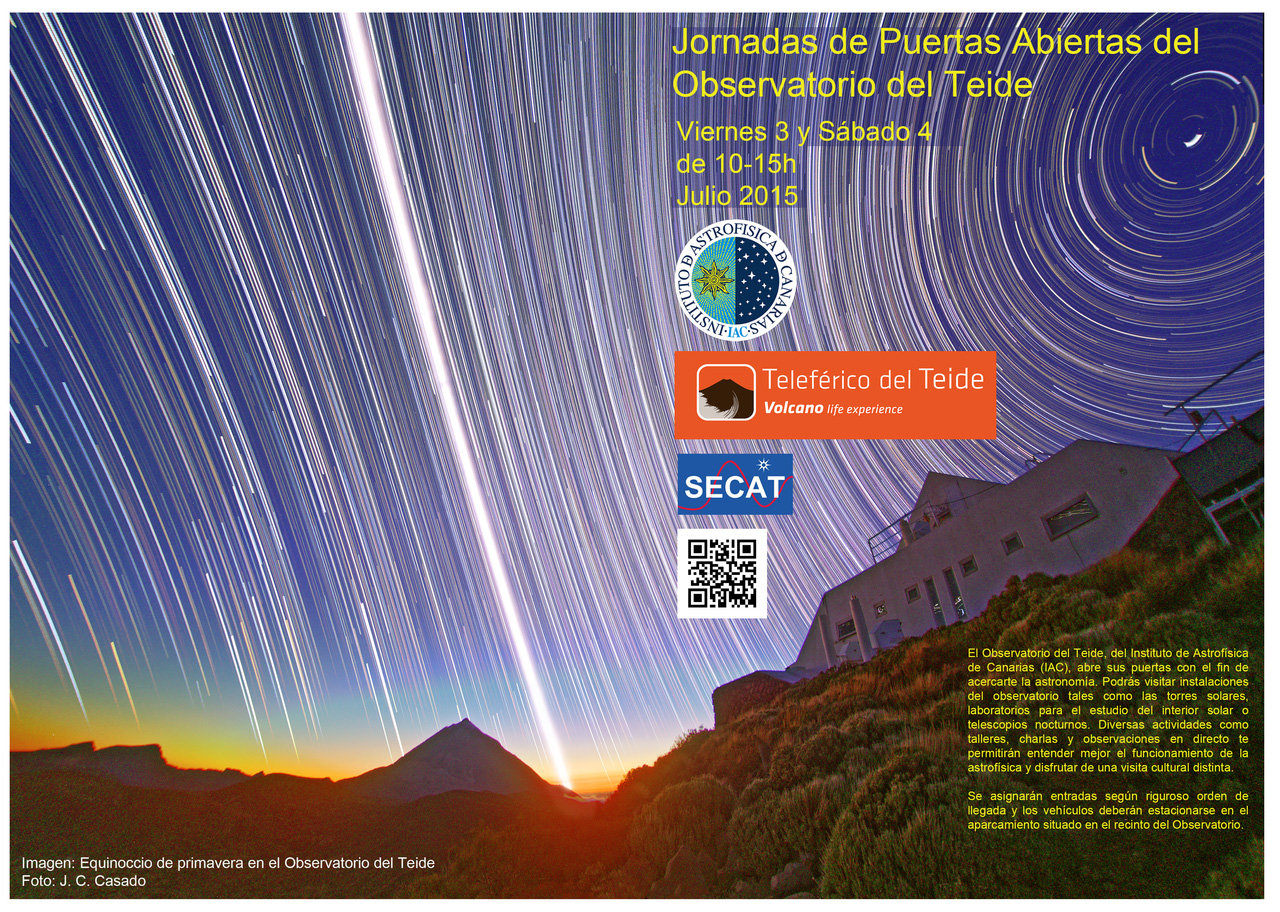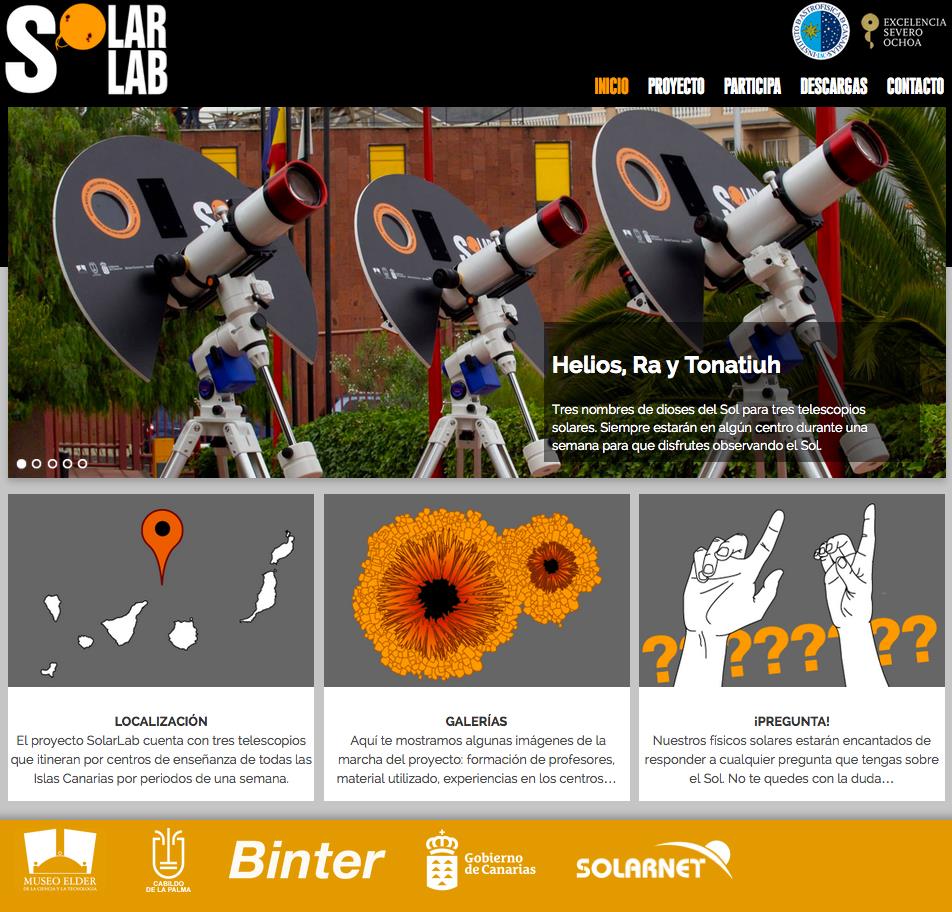July 2, 2015. Teide Observatory Open Doors Days: 3rd and 4th July, 2015.
- Details
- Published on Thursday, 02 July 2015 11:26

The Instituto de Astrofísica de Canarias (IAC) organises, as part of its outreach activities, two days visits to the Teide Observatory. The main goal of this activity is to bring astronomy closer to the general public.
From 10.00 to 15.00 will be offered guided visits to the telescopes and workshops, as well as direct solar observations. The visits serve to explain what an astronomical observatory is like, how the telescopes work, and why astronomy is so important for humanity.
The visitors will be able to see the Solar Telescope THEMIS, the IAC80 optical telescope, the Carlos Sanchez infrared telescope, the Solar Laboratory, the Optical Ground Station (OGS), the Solar Vacuum Tower telescope (VTT) and the new robotic telescopes.
Planning information
Free entries will be offered, in strict order of arrival. Private cars must be parked in the appropriate car parks within the observatory grounds.
As the observatory is in the mountains, we recommend comfortable shoes, the use of solar protection cream, and a hat, also some form of jacket or coat. Those with heart complaints or breathing problems should note that the altitude (2300 m above sea level) may cause health problems, for which we strongly adivsed previous consultation with a doctor.
Contact: This email address is being protected from spambots. You need JavaScript enabled to view it.
More info at Teide Observatory Open Doors Days 2015.
June 19, 2015. SolarLab: more than 80 000 Canary students have had the opportunity of observing the Sun…
- Details
- Published on Friday, 19 June 2015 08:35
 SolarLab –a public outreach initiative which aim is to bring the mysteries of the Sun to the secondary and high schools students in the Canary Islands– is closing with a high public impact.
SolarLab –a public outreach initiative which aim is to bring the mysteries of the Sun to the secondary and high schools students in the Canary Islands– is closing with a high public impact.
During two years, and for about a week, the Instituto de Astrofísica de Canarias (IAC) has moved a solar telescope to each of the 141 participating centers to give the students over 12 years old the opportunity to study and appreciate the star that ensures survival on the Earth.
The collaboration of more than 300 schoolteachers has been very important in achieving the project objectives.
Several Solar physicists from IAC as well as astronomers, and an astrophotographer have participated in Solarlab in forming the schoolteachers.
SOLARNET has collaborated in SolarLab and shares the goal of making solar physics research more attractive and more comprehensible for young students and for the public in general.
More details at SolarLab (in Spanish).
Click here to see the Image Gallery.
June 15, 2015. GREST Project kick-off meeting (Madrid, Spain).
- Details
- Published on Monday, 15 June 2015 09:58
The kick-off meeting of GREST (Getting Ready for the European Solar Telescope) -a H2020 funded project- is being held today in Madrid.
GREST is intended to take the European Solar Telescope (EST) to the next level of development by undertaking crucial activities to improve the performance of current state-of-the-art instrumentation. Legal, industrial and socio-economic issues will also be addressed, as key questions for the attainment of EST.
GREST is coordinated by the Instituto de Astrofísica de Canarias (IAC) and involves other 12 European institutions. The total cost of the project is EUR 3.956.730, and the EU contribution is EUR 2.977.273.
More details on GREST can be found at http://cordis.europa.eu/project/rcn/194915_en.html
May 25, 2015. The 3rd SOLARNET Workshop "Polarization in the Sun, the Solar System, and Beyond" started in Granada, Spain.
- Details
- Published on Monday, 25 May 2015 08:03
The 3rd SOLARNET Workshop “Polarization in the Sun, the Solar System, and Beyond” has been started today in Granada (Spain). This four days even (25-28 May 2015) is organized by the Instituto de Astrofísica de Andalucía (IAA-CSIC) under the auspices of SOLARNET.
The goal of this workshop is to present the latest advances in astronomical polarimetry and spectropolarimetry, with a focus on the sun, solar system bodies, stars, and exoplanets, and also to bring together the different communities and fostering collaborations between them.
In order to provide a detailed account of the latest developments in these areas -including instrumentation, measurement techniques, data analysis and interpretation- the following sessions have been scheduled: Instrumentation (ground, space, laboratory)
- Diagnostics and Interpretation
- Solar Photosphere
- Solar Chromosphere, Transition Region, and Corona
- Polarization in the Solar System and Exoplanetary Systems
- Stellar Magnetic Fields
The workshop is being carried out right after the 3rd SOLARNET School on “Solar Magnetic Fields: Modeling and Measuring Techniques," which also took place the last week in Granada, Spain.
More detais at 3rd SOLARNET Workshop.
More Articles...
- May 18, 2015. The 3rd SOLARNET School started in Granada, Spain.
- March 06, 2015. Focus Meeting 13 “Brightness Variations of the Sun and Sun-like Stars.” DEADLINE: March 18, 2015.
- Feb. 20, 2015. SOLARNET Announcement of Opportunity. Mobility Programme of Young Researchers. DEADLINE: March 15, 2015.
- January 20, 2015. 3rd SOLARNET Workshop "Polarization in the Sun, the Solar System, and Beyond", 25-28 May 2015, Granada, Spain (First Announcement).



